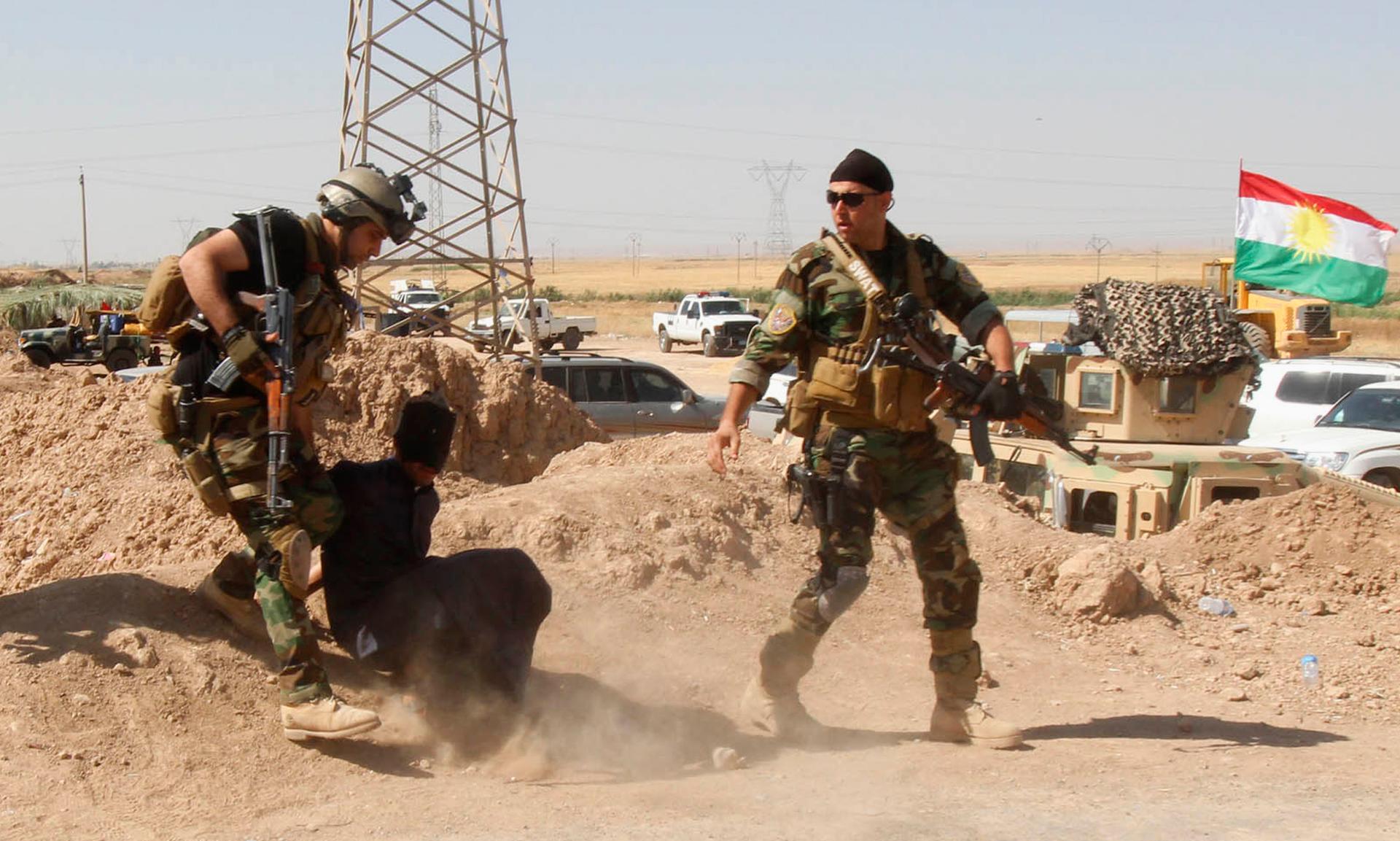The world’s richest jihadi group could ignite the entire Middle East
Personnel from the Kurdish security forces detain a man suspected of being a militant belonging to the al Qaeda-linked Islamic State in Iraq and the Levant (ISIL) in the outskirts of Kirkuk June 16, 2014.
The Sunni militant group ISIS captured Iraq's largest oil refinery over the weekend — a major blow to the Iraqi government and Baghdad's energy security.
But oil is just one part of the ISIS business strategy. What's behind the economics of ISIS? Aaron Zelin, the Richard Borow fellow at The Washington Institute for Near East Policy, calls ISIS a "unique" jihadi organization.
"They don't really get money from private donors in the Gulf like we've seen in the past with al-Qaeda," Zelin says. "They've more or less become self-sufficient. Part of this is because they're paranoid about being reliant on anybody else, so a lot of their money comes from the black market."
Zelin says that ISIS generates revenue by running kidnapping and ransom schemes, counterfeiting currency and illegally selling refined oil from areas they've captured. Additionally, Zelin says that ISIS also loots banks, and sells precious ancient artifacts uncovered from places like Syria.
"This has helped pad their coffers," he says. "Now they're probably the richest Sunni jihadi group we've ever seen."
The money that ISIS is generating, according to Zelin, is being funneled into the group's military operations in both Iraq and Syria, and being devoted to maintaining governments that ISIS has been able to capture.
"They even now have their eyes set on Saudi Arabia and Jordan based on some recent propaganda," he says. "Jordan will not give in to ISIS — they've been at war with ISIS, more or less, going back a decade or so when the group was originally charged by Abu Musab al-Zarqawi, who is a Jordanian. The Jordanians will never give in to ISIS."
Though Zelin says that Jordan will not surrender to ISIS, he does say that there are rumors circulating that ISIS is attempting to cross the border into Jordan.
"If that's the case, we'll likely see, for the first time, Jordan being dragged into this broad regional conflict," he says. "Their soldiers will likely start fighting them."
In addition to Jordan, Zelin says ISIS is getting closer to the Iranian border.
"It's believed that in one part they're only about 10 kilometers away," he says. "One of the biggest aspects for ISIS is their war with the Shias. If they have an opportunity for a cross border attack I would not be surprised if we see that as well."
This story is from an interview that aired on PRI's The Takeaway, a daily radio show that invites listeners into the American conversation.
The Sunni militant group ISIS captured Iraq's largest oil refinery over the weekend — a major blow to the Iraqi government and Baghdad's energy security.
But oil is just one part of the ISIS business strategy. What's behind the economics of ISIS? Aaron Zelin, the Richard Borow fellow at The Washington Institute for Near East Policy, calls ISIS a "unique" jihadi organization.
"They don't really get money from private donors in the Gulf like we've seen in the past with al-Qaeda," Zelin says. "They've more or less become self-sufficient. Part of this is because they're paranoid about being reliant on anybody else, so a lot of their money comes from the black market."
Zelin says that ISIS generates revenue by running kidnapping and ransom schemes, counterfeiting currency and illegally selling refined oil from areas they've captured. Additionally, Zelin says that ISIS also loots banks, and sells precious ancient artifacts uncovered from places like Syria.
"This has helped pad their coffers," he says. "Now they're probably the richest Sunni jihadi group we've ever seen."
The money that ISIS is generating, according to Zelin, is being funneled into the group's military operations in both Iraq and Syria, and being devoted to maintaining governments that ISIS has been able to capture.
"They even now have their eyes set on Saudi Arabia and Jordan based on some recent propaganda," he says. "Jordan will not give in to ISIS — they've been at war with ISIS, more or less, going back a decade or so when the group was originally charged by Abu Musab al-Zarqawi, who is a Jordanian. The Jordanians will never give in to ISIS."
Though Zelin says that Jordan will not surrender to ISIS, he does say that there are rumors circulating that ISIS is attempting to cross the border into Jordan.
"If that's the case, we'll likely see, for the first time, Jordan being dragged into this broad regional conflict," he says. "Their soldiers will likely start fighting them."
In addition to Jordan, Zelin says ISIS is getting closer to the Iranian border.
"It's believed that in one part they're only about 10 kilometers away," he says. "One of the biggest aspects for ISIS is their war with the Shias. If they have an opportunity for a cross border attack I would not be surprised if we see that as well."
This story is from an interview that aired on PRI's The Takeaway, a daily radio show that invites listeners into the American conversation.
